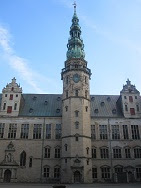There is nothing rotten in the state of Denmark.
At least that is my impression from traveling around the country at the UEFA U21 Championship these past two weeks.

Half-way between Germany and Sweden both geographically and culturally, close enough to London and the continent, yet far enough away to dance to its own Viking beat, this seems as close as it gets to a model country.
Add to that the high quality of life and standard of living and a most liveable capital in 'wonderful, wonderful' Copenhagen - it is just the sort of place FIFA should relocate to. After such an annus horribilis in Zurich, surely it is time to start afresh in pastures new.

Like Switzerland, Denmark is small and manageable - only five million inhabitants, and it makes some sense for FIFA not be working in the glare of a major football nation. A location near the heart of Europe is useful from a travel perspective, so the obvious candidates for a FIFA house-move would be Belgium (already home to the EU & NATO), Denmark or Luxembourg.
Here really would be ideal: Denmark is civilised and peaceful; it might not have the Alpine majesty of Switzerland - much of Denmark is flat or gently rolling farmland, although unlike that country, it does have a large and beguiling coastline, tranquil islands and plenty of Nordic gods and goddesses gliding by on bicycles. But more importantly it has cultivated a reputation for honesty and
 transparency which the sport's governing body desperately needs in 2011.
transparency which the sport's governing body desperately needs in 2011.This is no Hans Christian Andersen fairy story: Any visit proves how socialism and capitalism can blend successfully. It might be known for a robust welfare state with a top tax rate of 72%, but Denmark was also classed as the best country in the world for entrepreneurs in 2011 by London-based think-tank Legatum. There certainly seems no obvious poverty.
Last October, the Berlin-based Transparency International produced a
 list of the least corrupt nations on earth, and ranked Denmark the world's No.1.
list of the least corrupt nations on earth, and ranked Denmark the world's No.1.Denmark always ranks high on international rankings for its perspicacious business practices, respect for human rights and robust family and social provision. If it has a flaw it is with immigration, or more specifically handling multiculturalism, which turned sour after the Danish cartoon row of 2005. But this is common to all European nations now, i
 ncluding Switzerland.
ncluding Switzerland.An initially reluctant member of the European Union, Denmark has successfully married its role amid Europe's free-trade zone with a commitment to uphold its Scandinavian state model. Any Dane will tell you their post-war welfare model is crumbling by the day, but cast an eye around Copenhagen and life still seems to be better than elsewhere.
A pleasant ambience enfolds the largest city, whose terrasse culture has more in common with the Mediterranean than Northern Europe, and its housing models more collective and social than the English home-as-castle mentality. Nowhere else on earth do
 you see so many children being ferried around in boxes attached to bicycles, and the ubiquitous two-wheeled transportation seems to make people healthier and happier than sitting in traffic jams or standing on a sweaty tube train. Pedalling bikes beats pedalling drugs.
you see so many children being ferried around in boxes attached to bicycles, and the ubiquitous two-wheeled transportation seems to make people healthier and happier than sitting in traffic jams or standing on a sweaty tube train. Pedalling bikes beats pedalling drugs.The proof is in the pudding, and Danes consistently top surveys of personal happiness. Most recently as late 2010, Rotterdam University ranked Denmark as the world's happiest nation. When Gallup asked people around the world how blissful they were in 2011, guess which nation came first again...
And what is the most famous untranslatable Danish word - 'hygge' - an untranslatable concept, roughly explained as ‘spending a calm, comfortable time with good friends or loved ones, often while enjoying good food, snacks and something to drink’.

Surely FIFA employees would enjoy the life here too. So why not consider moving?
Greed for a start. Switzerland is a tax haven, not an accountable member of the EU. And the Swiss famously turn a blind eye to bank details. In the vaults of a courthouse in Zug, Switzerland, lies the verdict on the collapse of FIFA's marketing company ISL, whose contents would spell the end of Sepp Blatter as President and his expense-account cronies.

In a transparent EU member state, this verdict would have been revealed and justice would have been served. FIFA accounts in Denmark would be inspected, not concealed by auditors, and it would have to pay tax like any other multi-billion dollar organisation. A move to the EU would probably call time on FIFA's tax-free demands on any World Cup host too.
A move to Scandinavia would transform football's governing body from a shady and suspicious cabal ensconced in an impregnable bunker upon a Swiss hillside, redolent of the the lair of a Bond villain, into a universally trusted and respected steward of the game.

I do not expect Sepp & his gang to up sticks any time soon, but if the Swiss M.P Roland Buechel pursues his campaign to clean FIFA up to its logical conclusion, they will have to start scanning the 'for sale' ads before long.
FIFA moving to Denmark - now what could be wrong with that?
(c) Sean O'Conor & Soccerphile
Tags
World Cup Pens
World Cup Posters
Euro 2012 football
Tidak ada komentar:
Posting Komentar